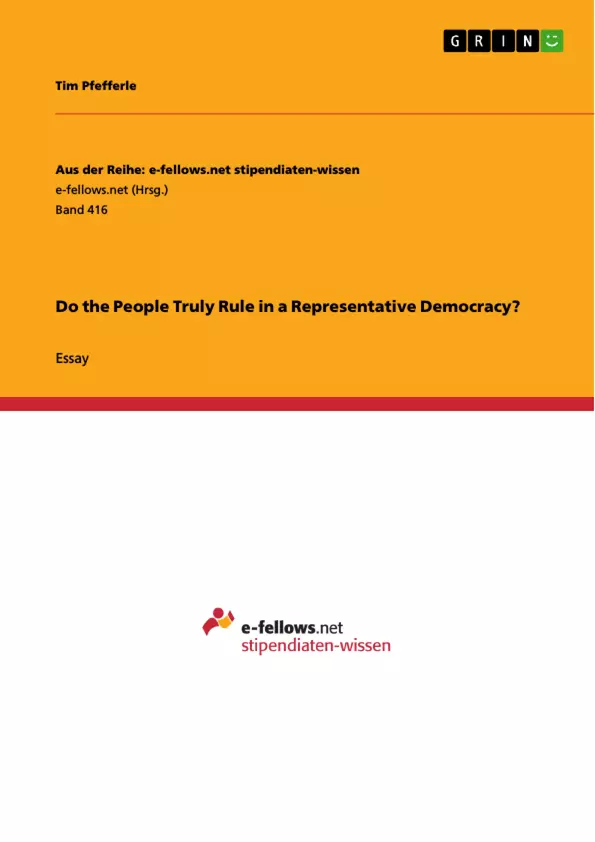This essay will deal with the question whether the people can be considered to rule in a representative democracy. While our representatives are only accountable to a limited extent, a democracy is supposed to be based on the idea of the sovereignty of the people. Therefore, representative democracy has to be compared to its challenger, direct democracy, to conclude whether a representative democracy is an adequate political system.
Inhaltsverzeichnis (Table of Contents)
- Introduction
- What is Democracy?
- Representative Democracy
- Representation
- Merits and Deficiencies
- Direct Democracy
Zielsetzung und Themenschwerpunkte (Objectives and Key Themes)
This essay aims to explore the concept of popular sovereignty in representative democracy, particularly in the context of the United Kingdom. The essay contrasts representative democracy with direct democracy, analyzing both the moral and instrumental dimensions of each system. It examines whether representative democracy can effectively embody the principle of "rule by the people".
- The dilemma of representative democracy: reconciling the sovereignty of the people with the delegation of power.
- The concept of representation: mandates vs. trusteeship.
- The advantages and disadvantages of representative democracy: deliberation, protection of minority rights, and potential for tyranny of the majority.
- The nature and functioning of direct democracy: its potential for increased participation and its limitations in terms of feasibility, moderation, and populism.
- The role of political parties in mediating between direct democracy and representative democracy.
Zusammenfassung der Kapitel (Chapter Summaries)
The introduction sets the stage by discussing the tension between the ideal of popular sovereignty and the reality of representative democracy, using Rousseau's critique as a starting point. The essay then defines democracy and its key elements, exploring the relationship between democracy and liberalism.
The chapter on representative democracy delves into the concept of representation, outlining the distinction between mandates and trusteeship. It examines the potential benefits of representative democracy, such as enhanced deliberation and protection of minority rights. However, it also acknowledges concerns about accountability and the potential for the "tyranny of the majority".
The chapter on direct democracy explores the principles and potential benefits of this system, highlighting its potential for increased public participation. However, it also discusses challenges related to feasibility, moderation, and populism. The essay considers the role of political parties in mediating between direct democracy and representative democracy, emphasizing the potential for public deliberation and the risks of polarization.
Schlüsselwörter (Keywords)
The essay centers on the key concepts of representative democracy, direct democracy, popular sovereignty, representation, deliberation, minority rights, tyranny of the majority, feasibility, moderation, and populism. It also touches upon the role of political parties and the potential for public participation in a democratic system.
Frequently Asked Questions
Do the people truly rule in a representative democracy?
The essay explores this dilemma, comparing popular sovereignty with the reality of delegated power to elected representatives who are only limitedly accountable.
What is the difference between direct and representative democracy?
Direct democracy involves citizens making decisions themselves, while representative democracy relies on intermediaries (MPs) to deliberate and vote on their behalf.
What is the "tyranny of the majority"?
It refers to the risk in democracies where the majority might oppress minority rights, a concern that representative systems aim to mitigate through deliberation.
How do political parties mediate between the people and the state?
Parties act as channels for public participation and deliberation, but they can also lead to polarization and distance between representatives and the electorate.
What are mandates vs. trusteeship in representation?
A mandate implies a representative must strictly follow voters' instructions, while trusteeship gives them the autonomy to act based on their own judgment for the common good.
- Quote paper
- Tim Pfefferle (Author), 2012, Do the People Truly Rule in a Representative Democracy?, Munich, GRIN Verlag, https://www.grin.com/document/191839



